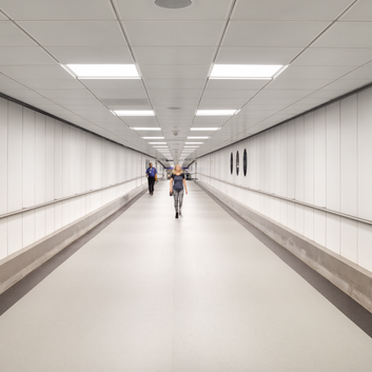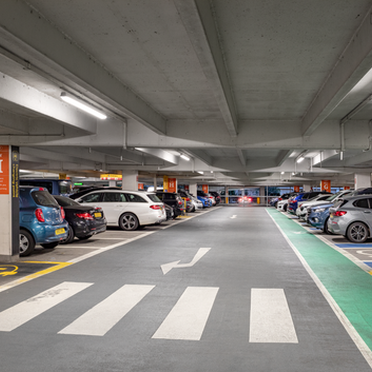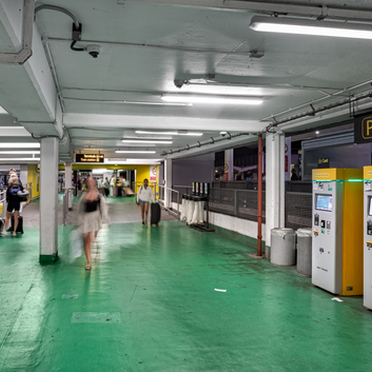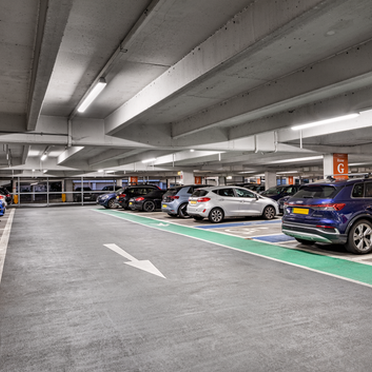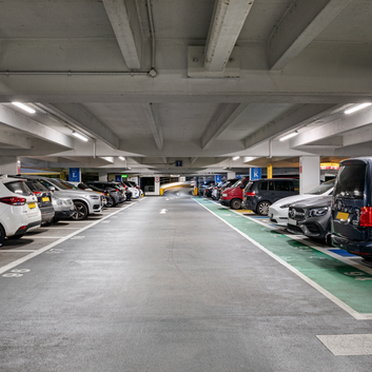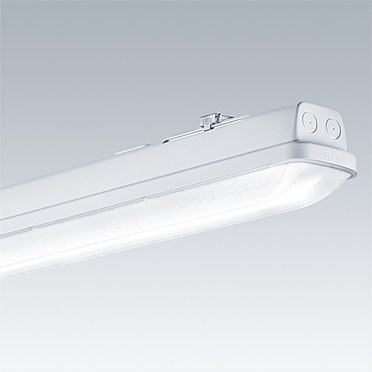Gatwick Airport, UK
Products
- Lamp efficacy
Lamp efficacy
Ensuring the lamp efficiently converts electricity into light (lm/W).
- Ballast classification
Ballast classification
Controlling the electricity supply to the lamp (Energy Efficiency Index).
- Luminaire distribution
Luminaire distribution
Controlling light emission using optics which bend and shape the light to the correct location.
- System efficacy
System efficacy
Combining optical and thermal control within the luminaire (luminaire lm/W).
- Presence/absence detection
Presence/absence detection
Presence: Lights automatically turn on/off with movement. Absence: Lights automatically turn off and must be manually switched on.
- Daylight detection
Daylight detection
Artificial lighting which responds to the natural light conditions.
- Constant illuminance
Constant illuminance
A function designed to produce correct light levels for the duration of the maintenance period.
- Task-scene setting
Task-scene setting
Allowing the user to set scenes and adapt the lighting to different tasks.
- Timed off
Timed off
Automatic cut-off can be installed to turn all lights off during unoccupied hours.
- Task lighting
Task lighting
Lighting task areas with the correct amount of light.
- Zoning of lighting
Zoning of lighting
Lighting is zoned according to area use.
- Maintenance schedule
Maintenance schedule
Maintenance must be performed in response to product age, performance and environment.
- Waste light
Waste light
Eliminating waste light which does not hit the intended target.
- Reflectance
Reflectance
Taking advantage of light which is reflected from the surface within the space.
- Visible smart metering
Visible smart metering
Results of actions can be quickly seen as increased or decreased energy use to encourage responsible energy consumption.
Opened in 1958, London Gatwick is said to be Britain’s second busiest airport following Heathrow.
Located 30 miles south of London, the international airport has one runway and two terminals spread across 1,670 acres of land, with the capacity to be used by up to 65 million passengers per year.
A hub for British Airways and other airlines including Emirates, Air France and Lufthansa, Gatwick Airport has big plans for the future. An application has been submitted to bring a second runway into use. By doing so, capacity could be increased to serve 75 million passengers a year by 2038. Consequently, other improvements would be necessary, including updating local roads, highways and infrastructure.
But these aren’t the only changes and plans being implemented for the future. Sustainability has been a key part of the airport’s transformation since 2009. Gatwick’s first and second ‘Decade of Change’ strategies ensure that there are many initiatives in place to achieve net zero by 2030. This includes upgrading all boilers to remove the need for natural gas, updating vehicle fleets to electric and protecting biodiversity.
Lighting refurbishment also plays a key role in that journey to net zero. In 2017 (as part of a different project), Gatwick’s runway lighting was switched to LED, making it 50% more energy efficient than when previously using halogen lights.
In 2023, Thorn has been pleased to further assist in the airport’s journey to net zero by upgrading lighting throughout multi-storey car parks 1, 2, 3 and 5, as well as surrounding walkways and other areas of the airport.
Jamie Yates, Key Account Manager for the Zumtobel Group said, “In order to help Gatwick reduce energy and cost and improve the overall light quality, we installed Thorn’s Aquaforce Pro in the main car parks. IP66 certified, the luminaire is resistant to water, dust and dirt and is housed in a tough shock-resistant IK08 body. As well as being easy to install, it also benefits from advanced connectivity. Through the use of basicDIM wireless controls, we’ve made it as easy as possible for Gatwick to enhance their energy saving potential.
“The overall lit effect has also been improved” Jamie added. “The previous installation showed areas of failure, creating different colour temperatures within one luminaire and pools of light. The new solution will apply light consistently where it’s needed, ensuring safety and comfort of car park users, which includes both pedestrians and drivers, and ultimately, enhance the customer journey.”
Gatwick Airport’sElectrical LV Manager Steve Wadd explained, “Early in 2023, we’d already opened conversations with Thorn about car park lighting, but we were then invited to participate in a webinar session hosted by the Parking Network in collaboration with Thorn. We were impressed by Thorn’s knowledge and expertise in indoor and outdoor lighting, and knew we could rely on them to find a car park lighting solution that would fully support our ambitions for the future, aligned with our ‘Decade of Change’ strategy. Aquaforce Pro has so far met our expectations as being a durable option for the multi-storey car parks. We estimate that the new lighting will generate XX amount of savings (energy/cost) in the next year.”
Alan Joannidi, Head of Application at Thorn Lighting said, “To be involved with the Gatwick Airport project was a great opportunity to showcase Thorn’s expertise and provide a great lighting solution for multistorey car parks. By example, we were able to demonstrate that a good lighting scheme provides users with a smooth and safe car parking experience.”
We’ve enjoyed working closely with Gatwick Airport on this refurbishment project to support their goals for a more sustainable future, and look forward to further opportunities to develop lighting solutions that will improve the airport environment for all users.
To find out more about Aquaforce Pro and the lighting solutions available for your next lighting project, click here.

